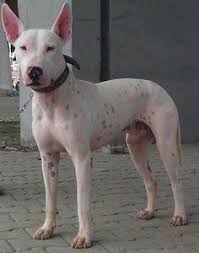
Gull Terrier
Conditions of detention
Gull Terriers are adaptable and can live in various environments, including rural, suburban, and urban settings, provided they get enough exercise. They thrive in homes with secure yards where they can play and explore.
Useful Fact: Due to their high energy levels and strong prey drive, they need a secure, fenced yard to prevent them from wandering off.
Nutrition and diet
A balanced diet of high-quality dog food, suitable for their age, size, and activity level, is essential for the Gull Terrier. Their diet should support their muscular build and high energy levels.
Useful Fact: Dividing their daily food intake into two meals can help maintain their energy levels and support healthy digestion.
Health
Gull Terriers are generally healthy but can be prone to certain conditions such as hip dysplasia, skin issues, and dental problems. Regular veterinary check-ups are crucial.
Useful Fact: Maintaining a proper diet and exercise routine, along with regular vet visits, can help prevent common health issues.
Grooming and care
The Gull Terrier has a short, dense coat that is easy to care for. Regular brushing will help remove loose hair and keep their coat healthy.
Useful Fact: Regular grooming sessions can also help detect skin issues or parasites early, ensuring prompt treatment.
Education and training
Gull Terriers are intelligent and strong-willed, requiring firm and consistent training. They respond well to positive reinforcement methods but need an experienced handler due to their dominant nature.
Useful Fact: Early socialization and obedience training are crucial to manage their strong prey drive and ensure they are well-behaved around people and other animals.
Toys and entertainment
Durable toys, such as heavy-duty chew toys and interactive toys, are suitable for Gull Terriers. They enjoy activities that challenge their minds and bodies.
Useful Fact: Engaging in activities like fetch, tug-of-war, and agility training can provide excellent physical and mental stimulation.
Safety
A secure yard with a sturdy fence is important to keep Gull Terriers safe, as they have a strong prey drive and might try to chase or confront perceived threats.
Useful Fact: Due to their strength and agility, using a strong, reliable leash and harness is important for safe walks and outdoor activities.
Accessories
Durable collars, leashes, and harnesses are necessary for handling their size and strength. Comfortable bedding and appropriate travel crates are also beneficial.
Useful Fact: Reflective gear can enhance visibility and safety during nighttime walks or in low-light conditions.
Socialization
Early socialization with other dogs, animals, and people is crucial for Gull Terriers to develop a balanced temperament. They are naturally protective and can be wary of strangers.
Useful Fact: Regular exposure to different environments and social situations can help mitigate excessive protectiveness and promote a well-adjusted demeanor.
Travel and Transportation
Gull Terriers generally adapt well to travel, especially if they are used to car rides from a young age. Secure travel crates or dog seat belts enhance safety during transportation.
Useful Fact: Providing a comfortable, familiar blanket or toy can help reduce anxiety during travel.
Behavior and psychology
Known for their loyal and protective nature, Gull Terriers form strong bonds with their families. They are independent thinkers and require mental and physical stimulation to stay happy.
Useful Fact: Regular exercise, mental challenges, and a clear role within the family structure contribute to their overall well-being and prevent behavioral issues.
Legal aspects
Owning a Gull Terrier may be subject to local pet laws and regulations, including breed-specific legislation, licensing, and leash laws.
Useful Fact: Being aware of and adhering to local regulations ensures responsible pet ownership and avoids legal issues.


